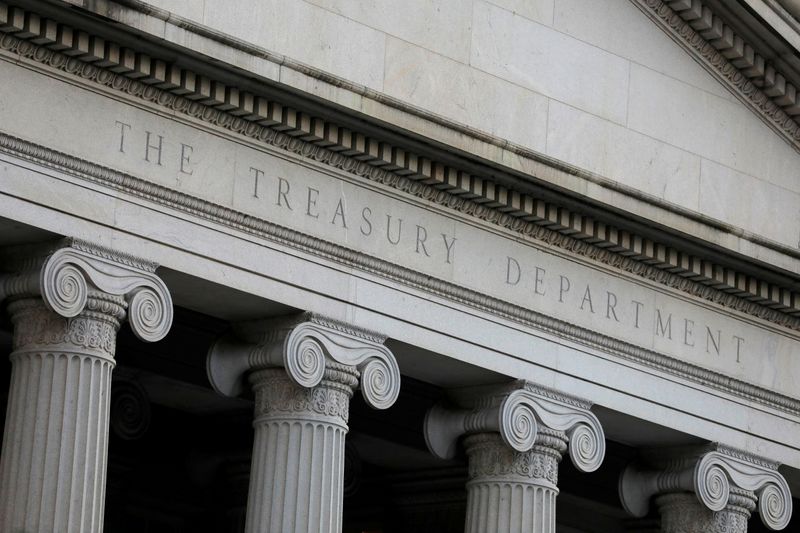By David Lawder and Andrea Shalal
WASHINGTON (Reuters) -The U.S. Treasury on Monday named climate change financial adviser John Morton to head the department's new "climate hub," disappointing activists who had sought a strong regulator to push financial institutions toward green investments.
John Morton, a partner with climate change advisory and investment firm Pollination Group, will work to foster green finance and use tax policy and financial risk assessments to help reduce carbon emissions as climate counselor to Secretary Janet Yellen, the Treasury said.
Morton brings more than 25 years of experience in emerging markets, investment finance and economic and environmental policy, the department said. He served in a senior climate post in the Obama administration and at the Overseas Private Investment Corp.
Morton will report directly to Yellen and advise her on a broad range of climate matters, in particular efforts to facilitate and unlock financing needed for investments to achieve 'net zero' carbon emissions, the Treasury said.
"Climate change requires economy-wide investments by industry and government as well as actions to measure and mitigate climate-related risks to households, businesses, and our financial sector," Yellen said in a statement.
"Finance and financial incentives will play a crucial role in addressing the climate crisis at home and abroad and in providing capital for opportunities to transform the economy."
NOT A REGULATOR
Morton joined Pollination Group in May 2020 after setting up the Climate Finance Partnership, a venture capital fund bringing together public, private and philanthropic funds to make climate-related investments in emerging markets.
It included funding from the French and German governments and BlackRock Inc (NYSE:BLK), the world's largest asset manager.
Several climate change and financial and consumer advocacy groups called Treasury's choice a disappointment, saying that Morton lacked financial regulatory experience and represented a private-sector answer to the problem of climate change.
"Mr. Morton's appointment is not the senior financial regulatory expert that many of us hoped to see," said Moira Birss, climate and finance director at Amazon (NASDAQ:AMZN) Watch. "A role this important cannot be filled by someone who believes ‘the market’ will fix the climate crisis or who is worried about profit-making off of the energy transition."
In February, more than 145 organizations urged https://mkus3lurbh3lbztg254fzode-wpengine.netdna-ssl.com/wp-content/uploads/Treasury-Letter.pdf Yellen in a letter to choose a climate czar with "deep regulatory expertise" at the Federal Reserve and the Treasury to force change through regulations.
At Pollination Group, Morton worked with companies that wanted to set ambitious corporate emission reduction and clean investment targets but didn’t have firm plans in place.
In an interview with Reuters earlier this year, Morton said the United States needed a stronger leadership voice through development banks and other institutions to mobilize more private capital to developing countries to help them transition to a lower-carbon economy.
"What has been lacking in the last four or five years, there has not been top-down pressure from the (previous) administration. The pressure of the bully pulpit appropriately applied can really unlock things," he said.
Morton joins several other high-profile climate change positions within the Biden administration, including a White House climate policy team led by former Environmental Protection Agency administrator Gina McCarthy and former Secretary of State John Kerry.
Kerry said earlier this month that President Joe Biden plans to issue an executive order https://www.reuters.com/article/us-imf-world-bank-climate/climate-risk-disclosure-requirements-will-spark-huge-investments-u-s-official-idUSKBN2BU3IX that will lead to greater disclosures of financial risks to investors by companies and financial institutions.

The Treasury said that in mobilizing financial resources to cut carbon emissions, the new climate hub would prioritize the expedited transition of high-emitting sectors and industries and would leverage tax and economic policies to support building climate resilient infrastructure.
The hub also will seek to understand and mitigate the risks that climate change poses to financial system stability and promote globally consistent approaches to assessing those risks, Treasury said.